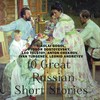Read the book: «Fables for Children, Stories for Children, Natural Science Stories, Popular Education, Decembrists, Moral Tales», page 27
THE FIEND PERSISTS, BUT GOD RESISTS
In ancient times there lived a good master. He had plenty of everything, and many slaves served him. And the slaves prided themselves on their master. They said:
"There is not a better master under heaven. He feeds us and dresses us well, and gives us work to do according to our strength, and never offends us with a word, and bears no grudge against any one; he is not like other masters who torture their slaves worse than cattle, and punish them with cause and without cause, and never say a good word to them. Our master wishes us good, and does us good, and speaks good words to us. We do not want any better life."
Thus the slaves boasted of their master. And the devil was annoyed to see the slaves living well and in love with their master. And the devil took possession of one of the master's slaves, Aleb. He took possession of him and commanded him to seduce other slaves. And when all the slaves were resting and praising their master, Aleb raised his voice and said:
"Brothers, in vain do you pride yourselves on the goodness of your master. Try to do the devil's bidding, and he, too, will be kind to you. We serve our master well, and please him in everything. He needs only to have a thing in mind, and we do it. – we guess his thoughts. Why, then, should he not be good to us? Stop doing his bidding and do him some wrong, and he will be like everybody else, and will repay evil with evil, much worse than the worst of masters."
And the other slaves began to dispute with Aleb. They disputed and made a wager. Aleb undertook to anger the good master. He undertook to do so on condition that if he did not succeed in making him angry, he should lose his holiday garment, but if he did, each should give him his own holiday garment, and, besides, they promised to defend him against the master and to free him if the master should put him in irons or throw him into prison. They made this wager, and Aleb promised to anger the master on the following morning.
Aleb was serving in the master's sheepfold and tended on costly thoroughbred rams. And so, when the good master came the next morning with his guests to the sheepfold to show them his favourite expensive rams, the devil's labourer winked to his companions: "Watch me now! I am going to anger the master." All the slaves gathered and looked through the door and over the enclosure, and the devil climbed a tree and looked from there into the yard, to see how his labourer was going to serve him. The master walked through the yard, showing his guests the sheep and lambs, and he wanted to show them his best ram.
"The other rams are nice, too, but the one with the twisted horns is priceless, and I think more of him than of the pupil of my eye."
The sheep and the lambs were shying from the people in the yard, and the guests could not get a good look at the expensive ram. The moment the ram stopped, the labourer of the devil, as though by accident, frightened the sheep, and they got all mixed. The guests could not make out which was the expensive ram. The master got tired of it, so he said:
"Aleb, my dear friend, take the trouble carefully to catch the best ram with the twisted horns and to hold him awhile."
The moment the master had said that, Aleb rushed forward, like a lion, into the midst of the rams and caught the priceless ram by his fleece. He got hold of the wool, and with one hand he seized the left hind leg and raised it and in the eyes of the master jerked it in such a way that it snapped like a linden post. Aleb had broken the ram's leg beneath the knee. The ram began to bleat and fell down on his fore legs. Aleb grasped the right leg while the left hung loose like a whip-cord. The guests and all the slaves groaned, and the devil rejoiced, when he saw how cleverly Aleb had done his work. The master looked blacker than night. He frowned, lowered his head, and did not say a word. The guests and the slaves were silent. They waited to see what would happen.
The master was silent, then shook himself, as though he wanted to throw something off, and raised his head and lifted it to the sky. He looked at it for a short time, and the wrinkles on his face disappeared, and he smiled and lowered his eyes on Aleb. He looked at Aleb, and smiled, and said:
"O Aleb, Aleb! Your master has commanded you to anger me. But my master is stronger than yours: you have not angered me, but I will anger your master. You were afraid that I would punish you, and you wanted to be free, Aleb. Know, then, that you will receive no punishment from me, and, since you wanted to be free, I free you in the presence of these my guests. Go in all four directions and take your holiday garment with you!"
And the good master went with his guests to the house. But the devil ground his teeth and fell down from the tree and sank through the earth.
LITTLE GIRLS WISER THAN OLD PEOPLE
It was an early Easter. They had just quit using sleighs. In the yards lay snow, and rills ran down the village. A large puddle had run down from a manure pile into a lane between two farms. And at this puddle two girls, one older than the other, had met. Both of them had been dressed by their mothers in new bodices. The little girl had a blue bodice, and the elder a yellow one with a design. Both had their heads wrapped in red kerchiefs. After mass the two girls went to the puddle, where they showed their new garments to each other, and began to play. They wanted to plash in the water. The little girl started to go into the puddle with her shoes on, but the older girl said to her:
"Don't go, Malásha, your mother will scold you. I will take off my shoes, and you do the same."
The girls took off their shoes, raised their skirts, and walked through the puddle toward each other. Malásha stepped in up to her ankles, and said:
"It is deep, Akúlka, I am afraid."
"Never mind," she replied, "it will not be any deeper. Come straight toward me!" They came closer to each other. Akúlka said:
"Malásha, look out, and do not splash it up, but walk softly."
She had barely said that when Malásha plumped her foot into the water and bespattered Akúlka's bodice, and not only her bodice, but also her nose and eyes. When Akúlka saw the spots on her bodice, she grew angry at Malásha, and scolded her, and ran after her, and wanted to strike her. Malásha was frightened and, seeing what trouble she had caused, jumped out of the puddle and ran home.
Akúlka's mother passed by; she saw her daughter's bodice bespattered and her shirt soiled.
"Where, accursed one, did you get yourself so dirty?"
"Malásha has purposely splashed it on me."
Akúlka's mother grasped Malásha and gave her a knock on the nape of her neck. Malásha began to howl, and her mother ran out of the house.
"Why do you strike my daughter?" she began to scold her neighbour.
One word brought back another, and the women began to quarrel. The men, too, ran out, and a big crowd gathered in the street. All were crying, and nobody could hear his neighbour. They scolded and cursed each other; one man gave another man a push, and a fight had begun, when Akúlka's grandmother came out. She stepped in the midst of the peasants, and began to talk to them:
"What are you doing, dear ones? Consider the holiday. This is a time for rejoicing. And see what sin you are doing!"
They paid no attention to the old woman, and almost knocked her off her feet. She would never have stopped them, if it had not been for Akúlka and Malásha. While the women exchanged words, Akúlka wiped off her bodice, and went back to the puddle in the lane. She picked up a pebble and began to scratch the ground so as to let the water off into the street. While she was scratching, Malásha came up and began to help her: she picked up a chip and widened the rill. The peasants had begun to fight, just as the water went down the rill toward the place where the old woman was trying to separate the men. The girls ran, one from one side of the rill, the other from the other side.
"Look out, Malásha, look out!" shouted Akúlka.
Malásha wanted to say something herself, but could not speak for laughter.
The girls were running and laughing at a chip which was bobbing up and down the rill. They ran straight into the crowd of the peasants. The old woman saw them and said to the peasants:
"Shame on you before God, men! You have started fighting on account of these two girls, and they have long ago forgotten it: the dear children have been playing nicely together. They are wiser than you."
The men looked at the girls, and they felt ashamed. Then they laughed at themselves, and scattered to their farms.
"Except ye become as little children, ye shall not enter into the kingdom of heaven."
THE TWO BROTHERS AND THE GOLD
In ancient times there lived not far from Jerusalem two brothers, the elder named Athanasius, and the younger John. They lived in a mountain, not far from the city, and supported themselves on what people offered them. The brothers passed all their days at work. They worked not for themselves, but for the poor. Wherever were those who were oppressed by labour, or sick people, or orphans, or widows, thither the brothers went, and there they worked, and received no pay. Thus the two brothers passed the whole week away from each other, and met only on Saturday evening in their abode. On Sunday alone did they stay at home, and then they prayed and talked with each other. And an angel of the Lord came down to them and blessed them. On Monday they separated each in his own direction. Thus they lived for many years, and each week the angel of the Lord came down to them and blessed them.
One Monday, when the brothers had already gone out to work and had gone each in his direction, the elder brother, Athanasius, was loath to part from his brother, and he stopped and looked back. John was walking with lowered head, in his direction, without looking back. But suddenly John, too, stopped and, as though he had suddenly noticed something, gazed at something, while shielding his eyes. Then he approached what he was gazing at, suddenly jumped to one side, and, without looking back, ran down-hill and up-hill again, away from the place, as though a wolf were after him. Athanasius was surprised. He went back to that spot, to see what it was that had so frightened his brother. He went up to it and saw something shining in the sun. He came nearer, and there lay a heap of gold on the ground, as though poured out from a measure. And Athanasius was still more surprised, both at the gold and at his brother's leap.
"Why was he frightened, and why did he run away?" thought Athanasius. "There is no sin in gold. The sin is in man. With gold one may do wrong, but also some good. How many orphans and widows may be fed, how many naked people dressed, and the poor and sick aided with this gold! We now serve people, but our service is small, though it is to the best of our strength. With this gold, however, we can serve people better."
Thus Athanasius thought, and he wanted to tell it all to his brother; but John was out of the range of hearing, and could be seen only as a speck the size of a beetle on another mountain.
Athanasius took off his cloak, scooped up as much gold as he was able to carry away, threw it on his shoulder, and carried it into the city. He came to a hostelry and left the gold with the keeper, and went back for the rest. When he had brought all the gold, he went to the merchants, bought some land in the city, and stones and timber, and hired labourers, and began to build three houses.
Athanasius lived for three months in the city, and built three houses there: one – an asylum for widows and orphans, another – a hospital for the sick and the lame, and a third – for pilgrims and for the needy. And Athanasius found three God-fearing old men, and one of them he placed in charge of the asylum, the second – of the hospital, and the third – of the hostelry. And Athanasius had still three thousand gold coins left. He gave each old man one thousand coins to distribute them to the poor.
The three houses began to fill up with people, and the people began to praise Athanasius for everything he had done. And Athanasius was glad of that and did not feel like leaving the city. But he loved his brother and so he bade the people farewell and, without keeping a single coin, went back to his abode, wearing the same old garment in which he had come.
As Athanasius was approaching his mountain, he thought:
"My brother did not judge rightly when he jumped from the gold and ran away from it. Have I not done better?"
And no sooner had Athanasius thought so than he saw the angel who used to bless him standing in the road and looking threateningly at him. And Athanasius was frightened and only said:
"For what, O Lord?"
And the angel opened his lips, and said:
"Go hence! You are not worthy of living with your brother. One leap of your brother is worth all the deeds which you have done with your gold."
And Athanasius began to speak of how many poor people and pilgrims he had fed, and how many orphans he had housed. And the angel said:
"The devil who placed the gold there has also taught you these words."
Then only did his conscience trouble him, and he saw that he had done his deeds not for God, and he wept and began to repent.
The angel stepped out of the road and opened the path on which his brother, John, was already standing and waiting for him. After that Athanasius no longer submitted to the temptation of the devil who had scattered the gold, and he understood that not with gold, but only with words can we serve God and men.
And the brothers began to live as before.
ILYÁS
In the Government of Ufá there lived a Bashkir, Ilyás. His father had left him no wealth. His father had died a year after he had got his son married. At that time Ilyás had seven mares, two cows, and a score of sheep; but Ilyás was a good master and began to increase his possessions; he worked with his wife from morning until night, got up earlier than anybody, and went to bed later, and grew richer from year to year. Thus Ilyás passed thirty-five years at work, and came to have a vast fortune.
Ilyás finally had two hundred head of horses, 150 head of cattle, and twelve hundred sheep. Men herded Ilyás's herds and flocks, and women milked the mares and cows, and made kumys, butter, and cheese. Ilyás had plenty of everything, and in the district everybody envied him his life. People said:
"Ilyás is a lucky fellow. He has plenty of everything, – he does not need to die."
Good people made Ilyás's friendship and became his friends. And guests came to him from a distance. He received them all, and fed them, and gave them to drink. No matter who came, he received kumys, and tea, and sherbet, and mutton. If guests came to see him, a sheep or two were killed, and if many guests arrived, he had them kill a mare.
Ilyás had two sons and a daughter. He had got all of them married. When Ilyás had been poor, his sons had worked with him and had herded the horses and the cattle and the sheep; but when they grew rich, the sons became spoiled, and one of them even began to drink. One of them, the eldest, was killed in a fight, and the other, the younger, had a proud wife, and did not obey his father, and his father had to give him a separate maintenance.
Ilyás gave him a house and cattle, and his own wealth was diminished. Soon after a plague fell on Ilyás's sheep, and many of them died. Then there was a famine year, the hay crop was a failure, and in the winter many head of cattle died. Then the Kirgizes drove off the best herd of horses. And thus Ilyás's estate grew less, and he fell lower and lower, and his strength began to wane.
When he was seventy years old, he began to sell off his furs, rugs, saddles, and tents, and soon had to sell his last head of cattle, so that he was left without anything. Before he knew it, all was gone, and in his old age he had to go with his wife to live among strangers. All that Ilyás had left of his fortune was what garments he had on his body, a fur coat, a cap, and his morocco slippers and shoes, and his wife, Sham-shemagi, who was now an old woman. The son to whom he had given the property had left for a distant country, and his daughter had died. And so there was nobody to help the old people.
Their neighbour, Muhamedshah, took pity on them. Muhamedshah was neither rich nor poor, and he lived an even life, and was a good man. He remembered Ilyás's hospitality, and so pitied him, and said to Ilyás:
"Come to live with me, Ilyás, and bring your wife with you! In the summer work according to your strength in my truck-garden, and in the winter feed the cattle, and let Sham-shemagi milk the mares and make kumys. I will feed and clothe you and will let you have whatever you may need."
Ilyás thanked his neighbour, and went to live with his wife as Muhamedshah's labourers. At first it was hard for them, but soon they got used to the work, and the old people worked according to their strength.
It was profitable for the master to keep these people, for they had been masters themselves and knew all the order and were not lazy, but worked according to their strength; but it pained Muhamedshah to see the well-to-do people brought down so low.
One day distant guests, match-makers, happened to call on Muhamedshah; and the mulla, too, came. Muhamedshah ordered his men to catch a sheep and kill it. Ilyás flayed the sheep and cooked it and sent it in to the guests. They ate the mutton, drank tea, and then started to drink kumys. The guests and the master were sitting on down cushions on the rugs, drinking kumys out of bowls, and talking; but Ilyás got through with his work and walked past the door. When Muhamedshah saw him, he said to a guest:
"Did you see the old man who just went past the door?"
"I did," said the guest; "but what is there remarkable about him?"
"What is remarkable is that he used to be our richest man. Ilyás is his name; maybe you have heard of him?"
"Of course I have," said the guest. "I have never seen him, but his fame has gone far abroad."
"Now he has nothing left, and he lives with me as a labourer, and his wife is with him, – she milks the cows."
The guest was surprised. He clicked with his tongue, shook his head, and said:
"Evidently fortune flies around like a wheel: one it lifts up, another it takes down. Well, does the old man pine?"
"Who knows? He lives quietly and peaceably, and works well."
Then the guest said:
"May I speak with him? I should like to ask him about his life."
"Of course you may," said the master, and he called out of the tent: "Babay!" (This means "grandfather" in the Bashkia language.) "Come in and drink some kumys, and bring your wife with you!"
Ilyás came in with his wife. He exchanged greetings with the guests and with the master, said a prayer, and knelt down at the door; but his wife went back of a curtain and sat down with the mistress.
A bowl of kumys was handed to Ilyás. Ilyás saluted the guests and the master, made a bow, drank a little, and put down the bowl.
"Grandfather," the guest said to him, "I suppose it makes you feel bad to look at us and think of your former life, considering what fortune you had and how hard your life is now."
But Ilyás smiled and said:
"If I should tell you about my happiness and unhappiness, you would not believe me, – you had better ask my wife. She is a woman, and what is in her heart is on her tongue: she will tell you all the truth about this matter."
And the guest spoke to her behind the curtain:
"Well, granny, tell us how you judge about your former happiness and present sorrow."
And Sham-shemagi spoke from behind the curtain:
"I judge like this: My husband and I lived for fifty years trying to find happiness, and we did not find it; but now it is the second year that we have nothing left and that we live as labourers, and we have found that happiness and need no other."
The guests were surprised and the master marvelled, and he even got up to throw aside the curtain and to look at the old woman. But the old woman was standing with folded hands, smiling and looking at her husband, and the old man was smiling, too. The old woman said once more:
"I am telling you the truth, without any jest: for half a century we tried to find happiness, and so long as we were rich, we did not find it; now nothing is left, and we are working out, – and we have come to have such happiness that we wish for no other.".
"Wherein does your happiness lie?"
"In this: when we were rich, my husband and I did not have an hour's rest: we had no time to talk together, to think of our souls, or to pray. We had so many cares! Now guests called on us, – and there were the cares about what to treat them to and what presents to make so that they should not misjudge us. When the guests left, we had to look after the labourers: they thought only of resting and having something good to eat, but we cared only about having our property attended to, – and so sinned. Now we were afraid that a wolf would kill a colt or a calf, and now that thieves might drive off a herd. When we lay down to sleep, we could not fall asleep, fearing lest the sheep might crush the lambs. We would get up in the night and walk around; no sooner would we be quieted than we would have a new care, – how to get fodder for the winter. And, worse than that, there was not much agreement between my husband and me. He would say that this had to be done so and so, and I would say differently, and so we began to quarrel, and sin. Thus we lived from one care to another, from one sin to another, and saw no happy life."
"Well, and now?"
"Now my husband and I get up, speak together peaceably, in agreement, for we have nothing to quarrel about, nothing to worry about, – all the care we have is to serve our master. We work according to our strength, and we work willingly so that our master shall have no loss, but profit. When we come back, dinner is ready, and supper, and kumys. If it is cold, there are dung chips to make a fire with and a fur coat to warm ourselves. For fifty years we looked for happiness, but only now have we found it."
The guests laughed.
And Ilyás said:
"Do not laugh, brothers! This is not a joke, but a matter of human life. My wife and I were foolish and wept because we had lost our fortune, but now God has revealed the truth to us, and we reveal this to you, not for our amusement but for your good."
And the mulla said:
"That was a wise speech, and Ilyás has told the precise truth, – it says so, too, in Holy Writ."
And the guests stopped laughing and fell to musing.




















